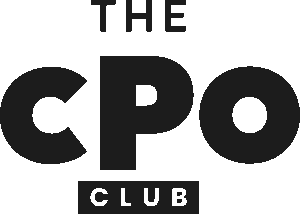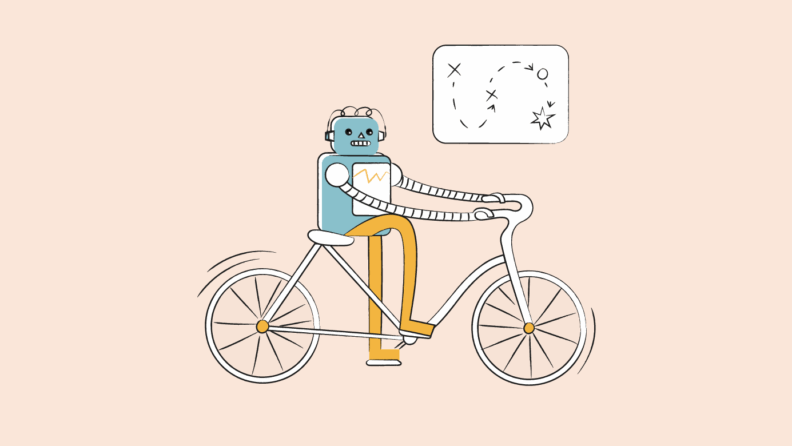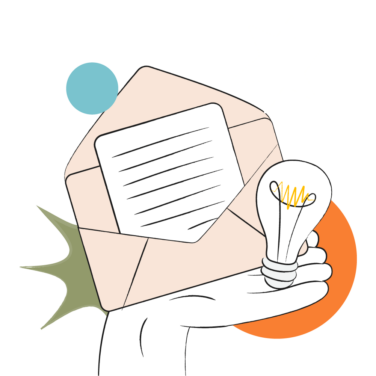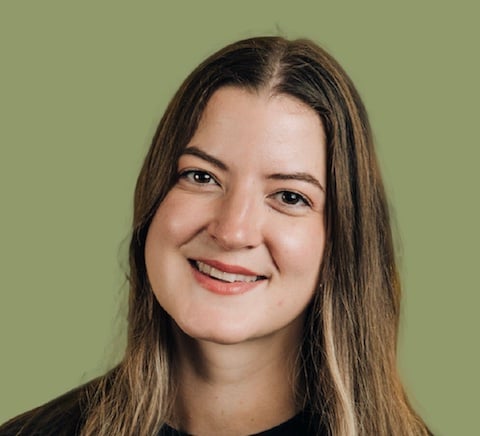“What’s an agent?” my dad asked me after I excitedly told him last weekend that I had built my “very first” relationship management agent (more on that later) as part of a work project.
“An agent! You know, a virtual robot that does things for you,” I responded.
“Like the virtual customer support chat agents they have on websites now?,” he asked excitedly as he connected the dots.
“Yes! Exactly,” I said. “Cool!” he concluded.
And that marked the end of that conversation, and offered the perfect opportunity for my husband to interject a comment about the Toronto Maple Leafs’ likely performance against the Florida Panthers that evening (we’re Canadian, obviously).
As I sit down to reflect on the state of entry-level product work, I think about the many conversations I’ve had over the past few weeks. Some of these I enjoyed with product and design leaders and others (most in fact) with my family and friends.
This chat with my father however, who I strongly admire, stands out to me because it serves as a stark reminder that professionals who are deeply invested in the newest technological trends often forget that the majority of working society does not live and breathe AI and agentic flows.
Is this blissful ignorance a privilege afforded to older professionals or a wisdom that comes with decades of seeing technological trends break onto the scene and eventually smooth into the rhythm of normal working life?
The Evolution of Entry-Level Work
There is no doubt that a shift is upon us. For those of us who work in tech, it’s impossible to scroll through LinkedIn, open our news feed or even talk to a colleague without hearing the words “AI,” “Automation” or “Agents” at least once.
A prevailing narrative that I’ve seen amid all this chatter is the impending death of entry-level work. Any movie from the 2000s would have you believe that the pathway to a successful career was to “get your foot in the door” as an assistant to a Big Time magazine editor, learn the ropes, put in the hours and work your way up from there (I see you Devil Wears Prada fans).
With AI threatening to eat up most of the tasks once delegated to the newest members of the workforce (sorry Andy) and the new crop of “entry-level” roles requiring at least three years of experience, new graduates have been left to wonder where they go from here.
As someone who was an entry-level worker not ten years ago (ironically also in the media industry - is my life based on the Devil Wears Prada?) I wonder whether this time it’s really all that different from previous technological changes that felt like cultural tectonic shifts, including social media, the smartphone, the internet…or even the wheel.
Holly Donahue, a fractional CPO who has over ten years of leadership experience offered a sobering second thought on AI’s ability to kick the human out of the loop once and for all.
“AI is very convincing in terms of it feels very human, but actually it's not, and it never will be. There are always going to be things that we need to do to kind of supervise it and to help it along the way.”
She added that technological change has historically created more jobs than it has eliminated - although the elimination part is undoubtedly painful. Of course, she was right. She used the example of online shopping.
“Jobs have been lost on the High Street, but they've been created in the tech industry."
I was relieved to hear her say this, as I’d just finished a conversation with a very impressive young professional who firmly believed that entry-level work was on its way out.
I became a mother for the first time almost two years ago, and as such the speculation about the future of work makes me anxious in a way that it never has before - both for my own ability to provide for my family and for my son’s future prospects.
Somehow, I am now ten years into my career, having made my own large jumps from journalism into marketing and from marketing into product management.
I want to share the advice that I wish someone shared with me as I navigated my early career as a young journalist entering a sector mired in layoffs, uncertainty and technological change.
Find your identity in solving problems, not in a job title.
When I applied for my very first job in product management, my then manager James Rubec asked me where I saw myself in five years. I told him that I saw myself solving problems for storytellers, and whatever job title I had to take on in order to do that is the job that I would have.
He appreciated that answer because he also had a background in journalism and had leveraged his experience into a successful product career in the communications technology niche.
This perspective has allowed me to be open to shedding my professional identity when it became apparent that a new one would serve my mission more effectively. I believe this is true for the majority of professionals who are making big moves, solving big problems and driving real change. But, more importantly, this is true for the professionals who stay employed during technological shifts.
Shedding your professional identity means getting curious - about new technology, new ways of working, you name it. Both James and myself have demonstrated this recently.
During our conversation, he revealed to me that he is using ChatGPT to convert customer feedback into usable, actionable insights.
This struck me, because it was exactly the task that he had me complete manually when I was a junior PM. At the time, I had spent almost no time in Excel and had to teach myself several new formulas in order to complete the project.
Fast-forward to last week, I built a relationship agent using Zapier and Google Sheets that automatically searches my calendar every day and finds the most recent meeting date with every name on my list of customers and contacts. If it’s been more than six weeks since I met with someone, the agent sends me an email.
I just described one job that’s been taken away by ChatGPT and agents - the grunt work of crunching data and tracking customer outreach - while describing another that has been created - the automation and acceleration of monotonous tasks to speed up time to value.
I look back at these moments - seemingly miniscule and insignificant - as extremely pivotal moments where both James and myself decided to dive into something new for the purpose of solving the prevailing problems that we are both so passionate about solving.
For today’s young professionals, I suspect the same mindset will serve you well. Find the problem you’re passionate about solving and then find the best way to continue solving it. Focus on that instead of the job title and the rest will follow.
Breadth is on the rise, but depth is going to make a comeback.
We live in a world of specialists. For years, the prevailing wisdom has been to identify your core skills and build deep expertise in a focused area. Specialization, after all, was the ticket to job security and upward mobility.
That thinking is being challenged. In recent years, experts have begun to argue that generalists will thrive in the AI era. With non-coders using tools like ChatGPT and Replit to deliver production-ready apps without writing a single line of code, it’s tempting to think that deep technical knowledge is no longer necessary.
My former colleague and friend Erun Fernando, a Product Director at Cision, sees this as an inflection point for young professionals. “I think the challenge and opportunity for junior talent is that they need to be able to learn executive functioning,” he told me — a reference to the meta-skills of prioritization, problem-solving, and decision-making that transcend tools.
And yet, depth still matters. In a recent conversation, Rubec reminded me that he wouldn’t be comfortable shipping a product that no one deeply understood. We still need people who know how the sausage is made.
A recent edition of Peter Yang’s newsletter echoed this duality, predicting that the future of product work will include two archetypes: generalists and specialists.
This means early-career professionals have a decision to make. Do you want to build broad, cross-functional experience and become a high-performing operator who can deliver features from end-to-end? Or, do you want to pursue deep technical or domain expertise that can’t be easily replicated?
There is no wrong answer, but whichever path you choose, be deliberate. Generalists will need to practice context-switching, learn how to learn quickly, and stay close to customer needs. Specialists, meanwhile, should commit to ongoing education, mentorship, and getting their hands dirty in the technical guts of a product.
And remember: when delivery-oriented generalists and detail-oriented specialists work together, amazing things happen. The best teams aren’t all one or the other, but rather, they’re a mix. Find your place on that spectrum, and play to your strengths.
Don’t wait for permission to start - it might land you a job (or a career).
When I was an undergraduate student studying journalism at Toronto Metropolitan University, I looked at my years in school as the first few years of my career.
I spent my early 20s building up a portfolio of published work that far dwarfed many of my peers who focused solely on school during that time. Was I exceptionally talented? Absolutely not. I was rejected (and ignored) ten more times than my pitches were accepted.
But, because I was relentless and driven with a one-track mind, I wound up with hundreds of published stories when I landed my first real reporting job at Global News.
Why am I telling you this? Because the head start I obtained from striking out on my own is the reason why I got my, then, dream job.
I believe my experience is applicable to today’s professional landscape. With the wide availability and affordability of tools that make building apps, starting businesses, publishing, etc., more accessible than those things have ever been, there is nothing standing in the way of young professionals building out a whole portfolio of work before even starting their first job.
One of the most actionable pieces of advice I hear again and again from hiring managers is to start doing the job before you get hired for it. Build side projects. Contribute to open source. Analyze a product and write a teardown. Use AI to speed up your learning curve and demonstrate how you think.
It could land you your dream job, or alternatively - if you’re like Jason Klug, 21-year-old co-founder of North America’s largest Lovable agency, Creme Digital, you might just make a career out of it.
We’re not the first generation to experience massive changes to the way we work. We won’t be the last.
There might be a reason why senior leaders I speak with regularly are less phased by the meteoric rise of AI than younger product professionals. Perhaps it has to do with having lived through some of the most instrumental changes to our working world in history - the internet, personal phones, social media, machine learning.
My father is one such senior-level professional. Less than ten years away from retirement, he works as a mechanical engineer and specializes in robotics. He’s tech-savvy and loves to add new gadgets to his home office and television room.
He’s also the very picture of adaptability, having navigated technological change throughout his career. He began his journey in machinery design and pivoted to equipment safety consulting when the passage of new legislation in Ontario in the early 2000s created an opportunity.
He started his career in the automotive sector and now largely spends his time in plants that manufacture food and consumer goods, evaluating their equipment for safety violations.
He has over thirty-five years of working experience. He watched the internet come onto the scene, started a business amid the market crash in 2008, and all the while raised four children. Now, still working, he is the best grandfather to my 18-month old son.
He is now just beginning to experiment with Microsoft Co-Pilot and is genuinely curious about how it can accelerate and add value to his work. We talk regularly about the discoveries we make each day as we play with these tools.
He’s open to new technology, but he also has the kind of work and life experience that can’t be erased by an agent, or even an LLM (sorry ChatGPT fandom). He’s seen how technology changes the workplace, he’s seen how people behave together, he’s tried things and succeeded, and perhaps more importantly, sometimes he failed.
What I’m left with after all these conversations and reflection is hope for the future of work and optimism about the prospects for entry-level product managers.
We are living through a period of unprecedented change, but not unprecedented challenge. The shape of early-career product work is shifting, yes. But it is not disappearing. The way in is no longer a tidy job posting with “0-2 years experience.” The way in might be a portfolio, a side hustle, a cold DM, a cohort-based course, a community Slack. But the door is still open, if you're willing to walk through it.
My advice to those starting out? Be adaptable. Be open-minded. Be driven. Be generous. Stay curious. Learn to learn. Follow your questions, not just your credentials. Learn the tools, but don’t worship them. Collaborate with agents, but don’t try to be one.
Because we don’t need more machines. We need more thoughtful, humble, hungry people to build the future with them.
So go build. You’ve got this.
Join for more insights!
Don't forget to subscribe to our newsletter for more product management resources and guides, plus the latest podcasts, interviews, and other insights from industry leaders and experts.




